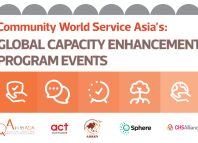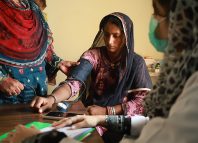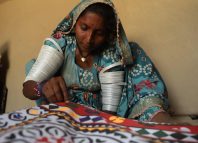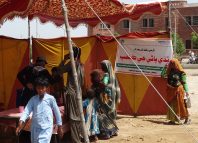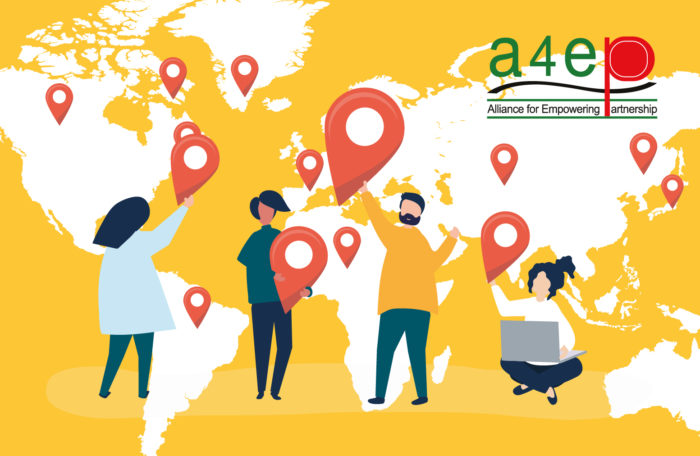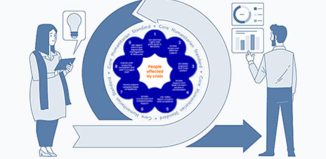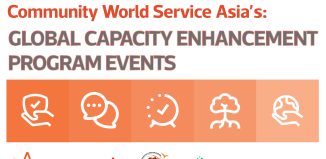Accountability – Who is Accountable to Whom?
When: October 15, 2020
What time: 11AM (Geneva, Switzerland time)
Where: ZOOM – Link to be shared
Language: English
How long: 90 minutes
Who is it for: Humanitarian and development practitioners working with NGOs, INGOs, UN agencies and academic institutes
Format: Presentation & Discussion
Panelists will make a five-minute presentation that will be followed by questions and answers, providing a space for participants to ask questions.
| Background and Purpose |
Accountability to affected populations has been a long-standing discussion in the aid sector. During the World Humanitarian summit in 2016 there was a renewed call to accelerate progress. Commitment 6 of the Grand Bargain urges humanitarian actors to enable a ‘participation revolution’ i.e. “include people receiving aid in decisions which affect their lives”. The Core Humanitarian Standard encourages humanitarian actors to create situations where “communities and people affected by crisis know their rights and entitlements, have access to information and participate in decisions that affect them.”
What is becoming more evident for local actors is that Accountability to Affected Populations can only become possible when there is Principled Partnership which creates mutually trustful environment and where accountability is not one-way, but two-ways – not only upward but downward as well. And it requires behavioural change from both partners. Principled Partnership means co-designing; co-creating processes with partners and the community.
Localisation is not only about the transfer of more resources to local actors but requires revolutionary change in the systems and processes to enable real participation of the major stakeholders in decision-making of aid. It is about power and it is about challenging the barriers that perpetuates power imbalance brought about by centuries of unequal relationships in the power structures. The formalistic complaints and response mechanisms and other accountability mechanisms are not adequate enough to address the more deep-seated problems, attitudes, behaviour and mind-sets. We need to establish a more conscious culture of accountability.
The webinar will help to explore:
- Who is accountable to whom?
- What needs to shift to improve partnership to deliver accountability to affected populations?
- How do we deal with the deeper-rooted issues of PSEA?
- How can we create a more conscious culture of accountability?
| Webinar Speakers |
 Regina “Nanette” Salvador-Antequisa – Ecosystems Work for Essential Benefits, Inc. – Executive Director
Regina “Nanette” Salvador-Antequisa – Ecosystems Work for Essential Benefits, Inc. – Executive Director
Regina “Nanette” Salvador-Antequisa is the founding Executive Director of Ecosystems Work for Essential Benefits, Inc. (ECOWEB) and convenor of the Community Led Emergency Action Response Network (CLEARNet) in the Philippines that actively promotes survivor and community-led response (SCLR) to crisis approach – a humanitarian-development-peace nexus advocacy in action. She has been in peace and development work for over 25 years and engaged in local and national policy advocacy on the issues of disaster, poverty, conflict, environment and governance. She is actively involved in international advocacy on localisation of humanitarian aid through her engagement with Charter4Change, Local to Global Protection and participation in the World Humanitarian Action Forum. She is the chair of global Alliance for Empowering Partnership (A4EP).
 Bernadette Castel-Hollingsworth – Deputy Director of the Division of International Protection (Field Protection Service), UNHCR – Co-Chair IASC Results Group 2 Accountability and Inclusion
Bernadette Castel-Hollingsworth – Deputy Director of the Division of International Protection (Field Protection Service), UNHCR – Co-Chair IASC Results Group 2 Accountability and Inclusion
Ms. Castel-Hollingsworth joined the United Nations High Commissioner for Refugees (UNHCR) in 2000 and has held numerous positions in Protection and Management in Pakistan, Liberia, Uganda, Sri Lanka, Tanzania, Central African Republic, Jordan, Myanmar, and Egypt. From November 2017-December 2018, Ms. Castel-Hollingsworth was Senior Protection Coordinator in Cox’s Bazar, Bangladesh, after which she was deployed on emergency support missions to Burkina Faso and Cameroon. Since May 2019, she has joined UNHCR’s headquarters in Geneva where she is the Deputy Director of the Division of International Protection (Field Protection Service).
 Angelina Nyajima Simon Jial – Hope Restoration – Executive Director
Angelina Nyajima Simon Jial – Hope Restoration – Executive Director
Angelina Nyajima Simon Jial is the Founder and Executive Director of Hope Restoration South Sudan, formed on 23 March 2010 in Unity State, South Sudan. The organization’s major area of focus is ending gender-based violence and force and early child marriage; keeping girls in schools; improving women’s standard of living; investing in food security and livelihoods; empowering women to be peacebuilders.
Angelina has chaired the National NGO Forum for two terms and represents national NGOs on the UN Humanitarian Country Team (HCT) and other country coordination mechanisms. Angelina is a Member of A4EP, Grand Bargain Localization Work stream 2 and, also a member of Call to Action. In March 2019, she addressed the Security Council on the issues of SGBV in South Sudan and lack of accountability particularly the Bentiu incident where over 150 women and Girls were raped during food distribution and most especially when going to collect firewood.
 Tanya Wood – Core Humanitarian Standard Alliance – Executive Director
Tanya Wood – Core Humanitarian Standard Alliance – Executive Director
Ms. Wood is the Executive Director of the CHS Alliance, a network of more than 150 organization making aid work better for people, through application of the Core Humanitarian Standard. She brings more than 20 years management and leadership experience in the international humanitarian sector, predominantly in international membership organizations.
 Marvin Parvez – Community World Service Asia – Regional Director
Marvin Parvez – Community World Service Asia – Regional Director
Marvin Parvez has twenty-eight years of experience in humanitarian relief, development, and advocacy in Asia, Europe and the Pacific. Marvin is also highly experienced in lobbying, advocacy, and resource mobilization. He has long-standing interests in setting quality and accountability standards, visibility and image building, as well as donor relations and networking. Marvin has been a strong & committed voice for just, dignified and equal partnerships between northern and southern NGOs. Marvin believes that if partnership paradigm is not changed & worshiping of brands & bottom-lines replaced by dignified & empowering partnerships, the whole sector and specially, large northern NGOs will experience decline and lose credibility.
| To register for the webinar, please click on this link: Who is Accountable to Whom? |

